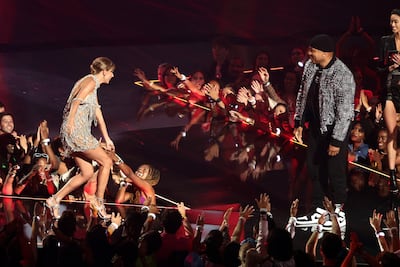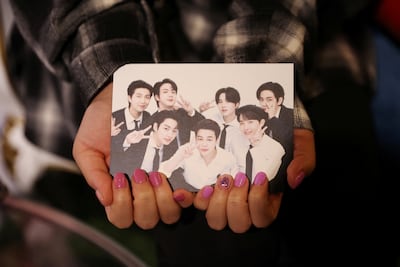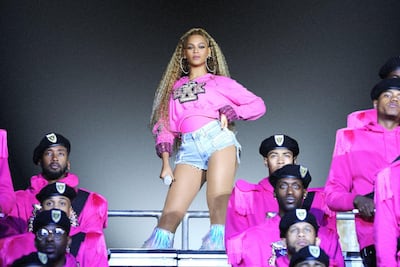Taylor Swift has been a cultural behemoth for years, but in 2024, the so-called “Taylor effect” has become downright all-encompassing.
Last week's Super Bowl, for instance, was the most watched in the history of the American sport, and Swifties, as they are known, have been credited with contributing to the record boost in viewership from last year’s 115 million.
Tuning in not to watch the game between the Kansas City Chiefs and the San Francisco 49ers, Swifties wanted to see their favourite singer cheer on her boyfriend, Chiefs tight end, Travis Kelce.
But that's just one example of how powerful her fan base has become, as their influence and spending power stretch far beyond traditional fan culture.
Swift's legion is not the only group that has tremendous influence on our current culture.
We highlight the world’s biggest fandoms and the lengths they go to to ensure their hero stays on top:
Swifties, Taylor Swift

Arguably the most powerful fan base in the world right now, Swifties (the word has been trademarked by the US singer) are among the most engaged and devoted.
Swift has been credited with redefining the relationship between celebrities and fans, creating an intimacy (or at the very least a perceived intimacy) between herself and her ever-growing throng of admirers.
By openly mining her private life for song material and using her tours, social media posts and Easter eggs in her music and videos, Swift has created a bond that goes beyond the traditional fan-celebrity relationship.
Calling the fan base “organised and undeniably effective”, Forbes wrote: “Swifties command a deeply active corner of the internet – one that’s not only celebratory but investigative and even conspiratorial in nature.”
Swift herself is well aware of the power of her fan base, galvanising them in her public feuds with Kim Kardashian and Kanye West, as well as during her music ownership dispute with Scooter Braun – Swifties attacked each of their social media platforms en masse.
Fans who repurchased her re-recorded albums, sent all four to number one in the US, UK and other countries. Her economy-stimulating tours, coupled with the spending power of her fans has been called “Swiftonomics”.
Interestingly, Swifties have grown with the singer, most notably during her pivot from country music to pop, a move that seems to highlight the fact that they are loyal to Swift as a person, not just as an artist.
Army, BTS

The South Korean boy band may be on hiatus right now as all seven members carry out their mandatory military service, but the fervour and loyalty of their fans shows no sign of abating.
Millions-strong, the Army started amassing beyond South Korean borders on a global scale after BTS became the first all-South Korean act to reach the number one spot on the US Billboard Hot 100 with their hit Dynamite.
As the music industry came to terms with the scope of the new K-pop phenomenon, they also got a taste of the fan base flexing its influential muscles when BTS won the Top Social Artist award at the 2017 Billboard Music Awards, having garnered more than 300 million votes.
Army, which stands for Adorable Representative M.C. for Youth, has shown that it can mobilise faster than any other fan base, particularly for charity endeavours the band supports.
On June 5, the Black Lives Matter organisation revealed it had received a $1 million donation from BTS and its record label. Twenty-five hours later, following an online campaign, the Army had matched the amount.
Potterheads, Harry Potter
The story of the global Harry Potter fandom is inextricably tied to the internet.
Published in the UK in 1997, and in the US the following year, Harry Potter and the Philosopher’s Stone gave rise to the first fandom to actively use the World Wide Web – still in its infancy, having been made available to the public in 1991 – to connect with fans around the world.
Thanks to its universal themes of friendship, loyalty, belonging and sacrifice, the books, and later the films, united millions globally, who took to sites and forums such as mugglenet and The Leaky Cauldron to meet like-minded fans, discuss plot points, share fan art and post fan fiction.
The fandom also gave birth to some of the first fan podcasts, including MuggleCast and PotterCast.
The collective power of the Potter fandom was fuelled in no small way by author JK Rowling who harnessed the power of the internet to engage with, support and boost many fan sites.
One of the biggest demonstrations of Potterhead power came in 2000 when Warner Bros bought the merchandising rights to Harry Potter and began sending out cease-and-desist letters to fans, demanding they close fan sites and delete their fan fiction.
Taken by surprise by the speed at which the community organised and pushed back, the Hollywood studio was forced to backtrack.
“We didn’t know what we had on our hands early on in dealing with Harry Potter [so] we did what we would normally do in the protection of our intellectual property,” Diane Nelson, Warner Bros Family Entertainment’s senior vice president at the time, told Henry Jenkins for his book Convergence Culture: Where Old and New Media Collide. “As soon as we realised we were causing consternation to children or their parents, we stopped it.”
The Beyhive, Beyonce

As one of the most famous and popular women in music, Beyonce has achieved near mythic status as a performer.
Her fan base is called the BeyHive – they call the star “Queen B” – and members are marked by their fierce loyalty and devotion to the Crazy in Love singer.
Despite having pointedly and deliberately withdrawn from the media gaze over the past few years in ways that would previously have been considered unfathomable from a publicity standpoint, Beyonce has not diminished her image nor her fan base.
Her last face-to-face interview was back in 2014, and since then she has conducted and directed all interviews and documentaries herself.
This has had the effect of creating an intimacy with her fans – she gives them details about new music, tours or fashion projects directly via her website and social media.
Over the years, the BeyHive has proven its ability to organise quickly to channel and direct their support both to causes the star extols and to anyone who criticises the singer.
One of the most famous examples of a BeyHive attack was in 2015 when Kid Rock told Rolling Stone he was “flabbergasted” by her success and criticised her music and appearance.
Fans converged on the rapper’s social media, flooding the comments section with their signature bee emojis.
When US rapper and radio show host Trick Daddy said in 2021 that he didn’t “think Beyonce could sing”, her fans headed to Google to leave scathing one-star reviews for his Sunday's Eatery restaurant, temporarily lowering its rating to 2.6.
